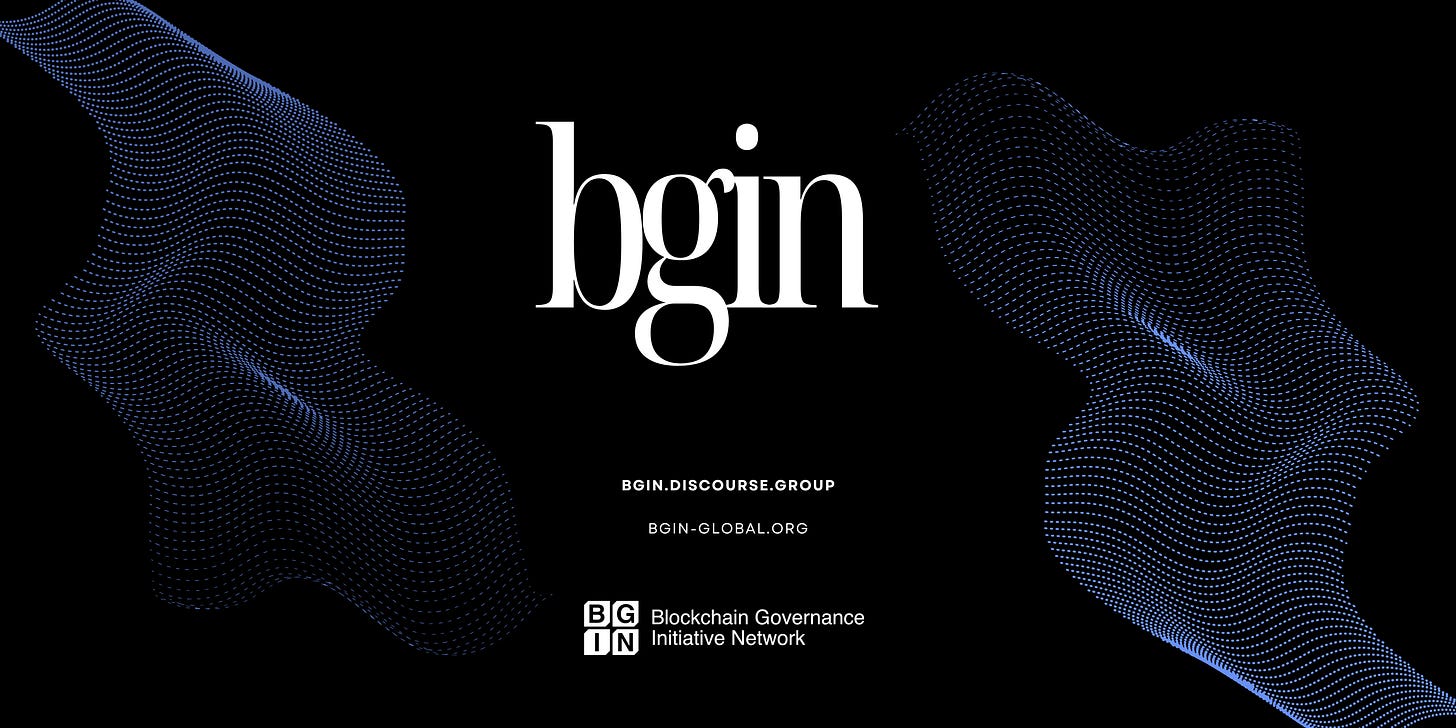Governance, Security, and Global Collaboration In Your Pocket
BGIN Block 10 Insights
In Tokyo, 2024, the Blockchain Governance Initiative Network had its 10th meeting.
These insights are condensed to share as a sync with the greater community.
Join the forum conversation by the bgin.discourse.group.
Our working groups meet online, every two weeks, and discuss the most pressing subjects relating to;
Identity Key Management and Privacy (IKP) Working Group
Financial Applications & Social Economics (FASE) Working Group.
In the rapidly evolving landscape of digital wallets and credentials, the session on Wallet Governance and Credential Management stands out as a bastion of insight and forward-thinking. As we delve into the complexities of creating a unified, secure, and user-friendly ecosystem for digital identities and transactions, it's clear that collaboration, innovation, and governance are pivotal to the journey ahead.
The Digital Wallet Ecosystem: A Conceptual Overview
The session started with exploring the conceptual model underlying digital wallets. This foundation is crucial, as it frames the interaction between claims providers, wallet software, and authentication processes. The emphasis on interoperability, security, and certification underscores a fundamental truth: trust is the cornerstone of the digital wallet ecosystem. Without it, the promise of seamless, secure transactions remains just out of reach.
Biometrics and Key Management: The Next Frontier
A highlight of the discussion was the innovative approach to biometric authentication and key management. The introduction of Biometrically Independent Fuzzy Signatures (BIFS) marks a significant step forward. This technology leverages biometric information, offering a more secure and user-friendly way to manage keys. It addresses longstanding challenges, presenting a pathway to a future where digital identities are both more secure and more accessible.
The Gordian Knot of Governance
However, innovation alone cannot navigate the complexities of digital wallet governance. The session illuminated the diverse landscape of governance models—from government-issued wallets to private-sector solutions and certification bodies. The challenge? Creating a globally interoperable system amidst a maze of legal, technical, and operational frameworks. This challenge is not trivial; it requires a nuanced understanding of the diverse needs and regulations across jurisdictions and sectors.
Open Wallet Foundation: A Beacon of Collaboration
Enter the Open Wallet Foundation, a testament to the abilities of open, collaborative development. With a governance model rooted in community-driven development, transparency, and meritocracy, the foundation exemplifies how to build trustworthy and inclusive digital wallet solutions. It's an approach that values the merit of code over the might of capital, fostering an environment where innovation thrives.
Real-World Applications and Lessons Learned
Practical considerations were not left by the wayside. Discussions on real-world applications, such as the varied success of vaccination certificate deployments, highlighted the importance of user-centric design and cross-border usability. These conversations brought to light the critical balance between innovation and accessibility, emphasising that technology must serve the needs of its users, wherever they may be.
Charting the Course Ahead
The session concluded with a clarion call for enhanced collaboration and dialogue among stakeholders. The potential of digital wallets to revolutionise privacy, security, and convenience in digital transactions is immense. However, realising this potential requires systems that are not only technologically advanced but also globally inclusive and adaptable to the needs of diverse populations.
The Road to Global Interoperability
As we look to the future, the path to global interoperability is fraught with challenges. The session underscored the need for a collaborative approach to governance, one that transcends borders and sectors. It's about creating a "safe space" where governments, the private sector, and civil society can come together to share insights, learn from each other, and align efforts. This is not a sprint but a marathon—a concerted effort to build an ecosystem that respects the sovereignty of nations while fostering global collaboration.
Inclusion and Accessibility: Keys to Success
Moreover, the discussion on inclusion and accessibility reminds us that technology must serve all segments of society. From the smartphone-equipped urbanite to the rural dweller with only a feature phone or a piece of paper, digital wallet solutions must degrade gracefully, ensuring that no one is left behind in the digital divide.
Conclusion
The session on Wallet Governance and Credential Management was more than a discussion—it was a roadmap for the future of digital wallets and identities. It highlighted the importance of governance, security, and collaboration in building a digital wallet ecosystem that is not only secure and interoperable but also accessible and inclusive. As we move forward, let us take these insights as guiding principles, working together to unlock the full potential of digital wallets for everyone, everywhere.
The journey toward a unified digital wallet ecosystem presents many challenges, but so are the opportunities. By fostering open governance, prioritising security, and embracing global collaboration, we can navigate the complexities of this landscape and ensure that the future of digital wallets is bright, secure, and inclusive for all.



